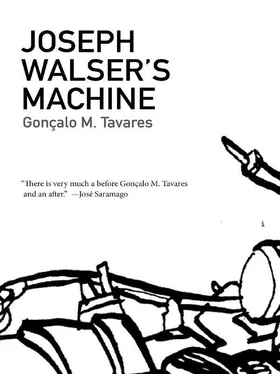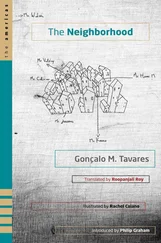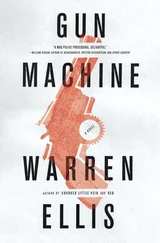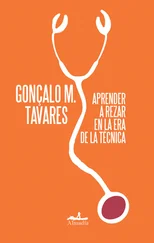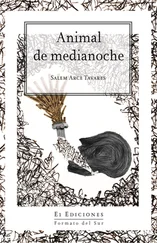Walser took great pleasure in this idea. If that piece belonged to a weapon, be it large or small, it would no longer be able to function now, since the piece in question was right there, in front of him, on his desk, just inches from his hands.
Looking down again at the piece of metal, he felt that he was interfering in the war. There’s a weapon that can’t fire because I have one of its parts right here! For the first time, he felt like he was a part of something: he was participating. Furthermore: he felt that it — the war — had finally become important to him. He, Joseph Walser, was touching, with his undamaged left hand and his right hand with its missing finger — the index finger — a weapon; he possessed, at that moment, in his very hands, an indispensable part of the conflict. He had interrupted the war.
An absurd thought even popped into his head, that he should start stealing a piece, albeit a tiny one, from each weapon in the city, and thus, through almost imperceptible means, put an end to all the bother. “A one-man conspiracy,” said Walser, and he couldn’t stop smiling at how ridiculous the idea was.
But he really was interrupting the war, there was no doubt about it in his mind. By recording the data from that piece of metal, by adding it to his collection, he was removing it from the world, removing it from the reach of other men’s actions. And a question subsequently arose: which side did the weapon — the one that he had interrupted, so to speak — belong to? Which side? The army of the occupation? The guerrillas? And, ultimately, what did it matter?
He finally understood his precise position in relation to the formidable events taking place in the city: What did it matter who the weapon belonged to? The answer wasn’t relevant. He had merely acquired a new specimen for his collection.
Meanwhile, he heard a noise. It was the front door. Margha had just left.
Joseph Walser slid the ruler across the desk with his right hand. He had to confirm the width of the piece of metal, but his right hand was shaking.
Having just finished his shift a few minutes earlier, Joseph Walser was gathering his things before he went home when he received a visit from Klober, the foreman, with whom he hadn’t crossed paths for a number of weeks.
“Joseph Walser, it’s good to see you!”
The two men shook hands, with Klober, as usual, being the more forceful of the two.
“I can see that it’s getting better, it’s not so red anymore,” said Klober, looking at Walser’s hand. “The body gets accustomed to things, doesn’t it?”
Joseph said nothing.
“My dear Walser, I came here specifically to see you. I’m paying you a visit, if that’s what you’d like to call it. I’m fond of you, it’s undeniable. And even the distance that our different positions have created between us hasn’t extinguished my fondness for you. How can I explain it? There are a number of reasons, some of which aren’t very concrete or logical, but there are others that you know quite well.
“I want you to know that I was dismayed by your accident. I wouldn’t go as far as to say that it changed my life, you know me well enough to know that neither hypocrisy nor feigned concern is really my style. My dear Walser, we’re both men, and my life, obviously, has to go on.
“You might think that I took pleasure in your accident, but when we shook hands just moments before, I felt a very strong connection between the two substances involved: my hand and yours. It seems strange, but that’s life: strangeness; until the very last instant: strangeness.
“But let’s move on: Walser, I have a certain fondness for you — let me repeat — a certain irrational fondness for you, so much so that it puts me at risk. That’s why I want to tell you quickly what I came here to say. I have important information. I advise you to forget about the dice game tomorrow night at your good friend Fluzst’s house. Certain friendships are problematic, my dear Walser, but it’s our heart that decides who we’ll be friends with — as our beloved Romantics would say — not us. Well then, it’s time to put some other organs to use, if I may put it that way. It’s not the time for intuitive gut feelings to take responsibility for our actions. The head, Walser, we live in a time when the head is the most important organ, so to speak. We must keep it raised higher than the rest of one’s organism, you see? Higher. In tumultuous times, hierarchies should be preserved at all cost: the head, as you, my good sir, have certainly already noticed, was placed in a privileged position, if we can call it that, upon the human organism. On top, you see? Right up top. Of course, sometimes it would almost be better if our brains were located in some other part of our organism, some place that’s better protected. I just came in from the street, Walser, and I saw a body, the body of a man — now hardly a man at all, I would say — with his head disfigured, a soldier whose head had been disfigured by two bullets. And it’s at moments like those when you realize that our intelligence should be better protected, it should have been placed somewhere down low, not up top, where it’s so visible. But, as you can plainly see: there’s no solution.
“Still, while we’re still alive on this magnificent earth, which we undoubtedly love unequivocally, you and I, so much so that we’d be willing to die for it — isn’t that right, Walser, my friend? Well then, when the country seems like it is falling to pieces, at those times, at these times, we should simply protect the organs that enable us to perceive the world; and you know very well which ones those are.
“The rest of it doesn’t concern us.
“But forgive me for going on like this, it’s just that I’m overjoyed to see you again, and the presence of my good friend Walser lets my rational mind loose; I feel eloquent when I’m by your side. Well then, here is the important information, once more; an extremely important piece of information: tomorrow, Saturday, forget about that dice game! Tomorrow night they’re going to arrest Fluzst. That man has gotten himself into a disastrous mess.
“I know that Fluzst is your friend, or some such similar thing, and, by the way, I’ve never known you to have any others; you, my good sir, aren’t an easy man to get along with, as you must know, and you’ve developed very few relationships. We all belong to the same world and the same eternity, if I may use that word, so we should get to know each other better, don’t you think? Maybe that way we’d be able to love one another, who knows?
“There’s one day left, enough time for you to leave here and warn Fluzst. Or, on the other hand, you can take my advice: just forget about your dice game tomorrow. From what I’ve heard, you haven’t won that much anyway, and money isn’t the only thing that keeps us alive, as you must have already realized.
“My dear Walser, it’s such a pity, but I really have to say good-bye. It was good to see you again, and it’s always a pleasure to do so. I forgot to mention that the information I gave you is completely confidential, not even your adorable wife should know about it. Consider this a test of your personality. You have one day, more than twenty-four hours in front of you, to prove your convictions and intelligence. Once again I hold my right hand out to you; hold yours out to me as well. My dear Walser, I’m counting on you.”
Saturday night the city takes on an odd logic; a schizoid personality becomes readily apparent in men who are able to move straight from their loathsome days into occupying themselves, remorselessly, with nonstop dancing and dim, arousing lights. People are having fun.
Читать дальше
